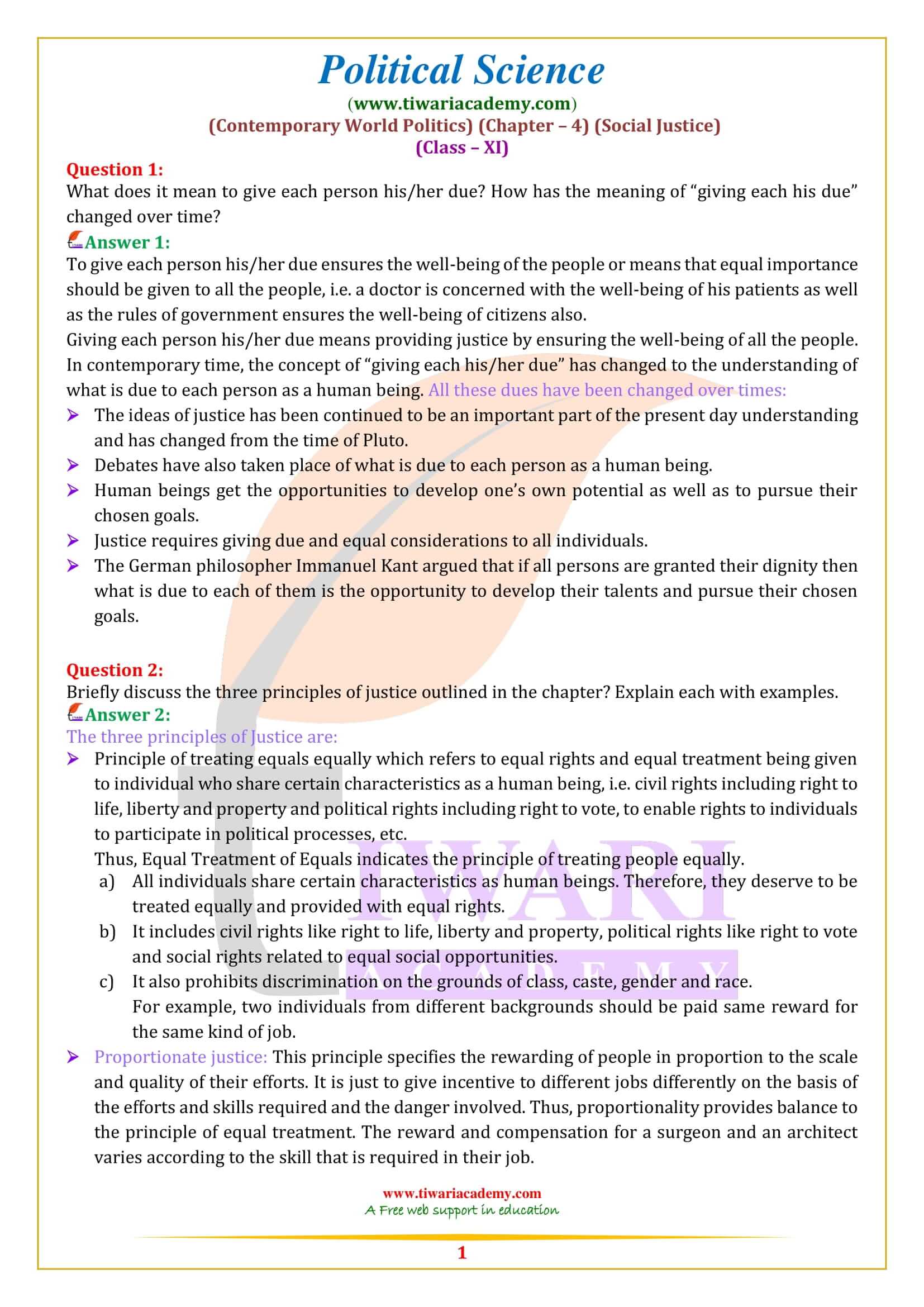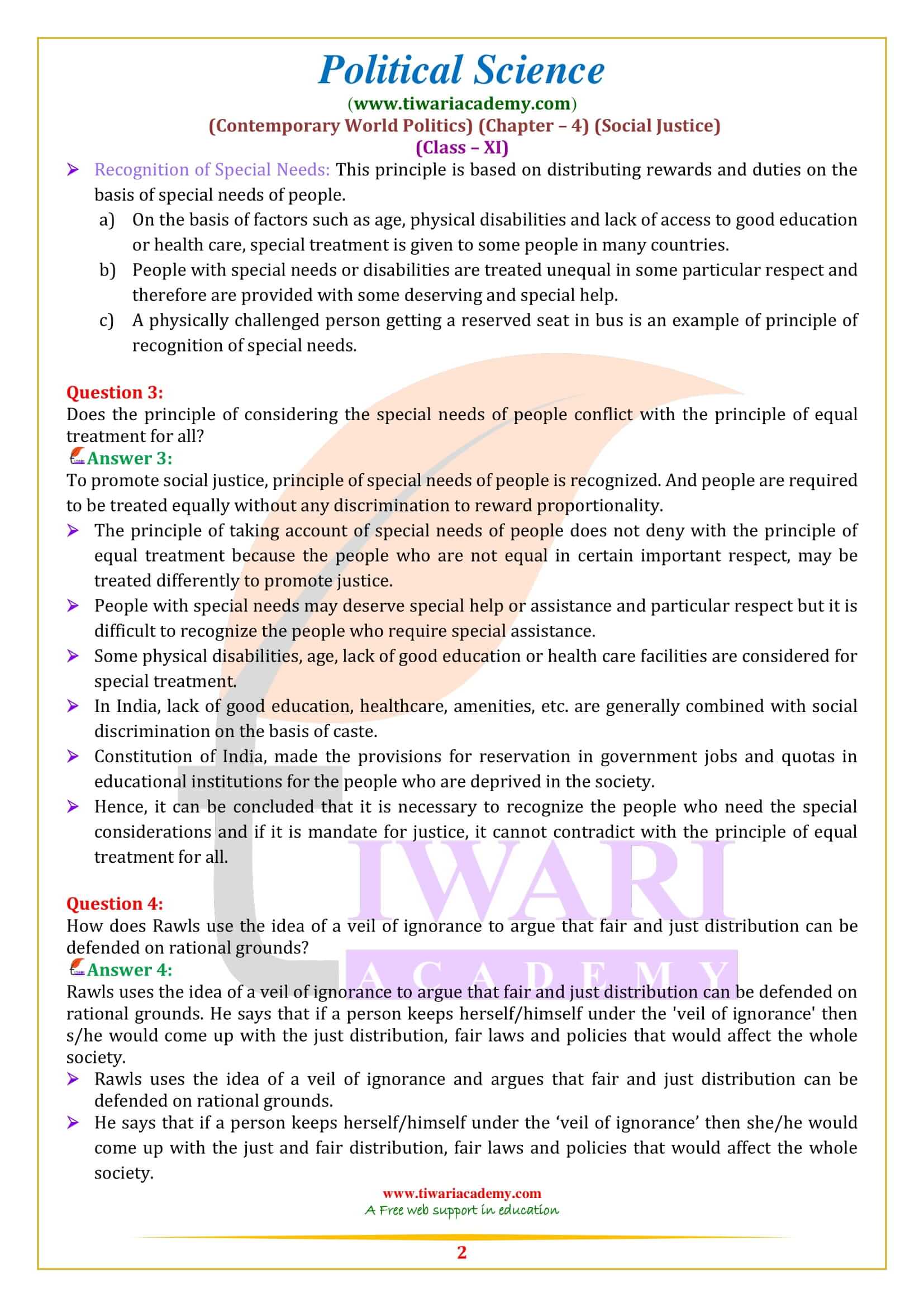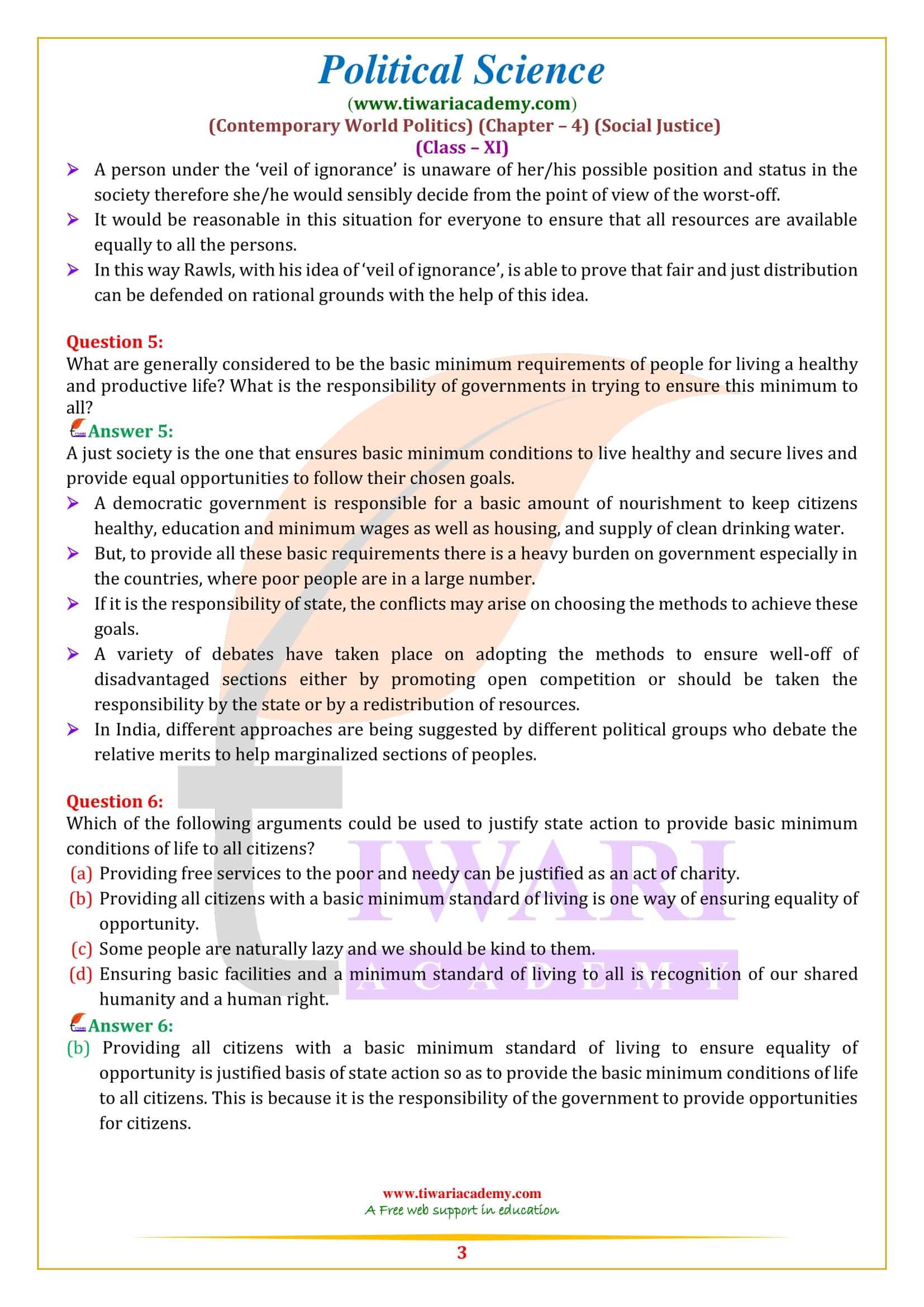NCERT Solutions for Class 11 Political Science Chapter 4 Social Justice in English and Hindi Medium with all the important extra questions updated according the new syllabus for 2025-26. Students can get here questions answers of class 11 Political Science chapter 4 of Political Theory NCERT textbook.
NCERT Solutions for Class 11 Political Science Chapter 4
What does it mean to give each person his/her due? How has the meaning of “giving each his due” changed over time?
To give each person his/her due ensures the well-being of the people or means that equal importance should be given to all the people, i.e. a doctor is concerned with the well-being of his patients as well as the rules of government ensures the well-being of citizens also.
Giving each person his/her due means providing justice by ensuring the well-being of all the people. In contemporary time, the concept of “giving each his/her due” has changed to the understanding of what is due to each person as a human being. All these dues have been changed over times:
- The ideas of justice has been continued to be an important part of the present day understanding and has changed from the time of Pluto.
- Debates have also taken place of what is due to each person as a human being.
- Human beings get the opportunities to develop one’s own potential as well as to pursue their chosen goals.
- Justice requires giving due and equal considerations to all individuals.
- The German philosopher Immanuel Kant argued that if all persons are granted their dignity then what is due to each of them is the opportunity to develop their talents and pursue their chosen goals.
Briefly discuss the three principles of justice outlined in the chapter? Explain each with examples.
The three principles of Justice are:
Principle of treating equals equally which refers to equal rights and equal treatment being given to individual who share certain characteristics as a human being, i.e. civil rights including right to life, liberty and property and political rights including right to vote, to enable rights to individuals to participate in political processes, etc.
Thus, Equal Treatment of Equals indicates the principle of treating people equally.
- a) All individuals share certain characteristics as human beings. Therefore, they deserve to be treated equally and provided with equal rights.
- b) It includes civil rights like right to life, liberty and property, political rights like right to vote and social rights related to equal social opportunities.
- c) It also prohibits discrimination on the grounds of class, caste, gender and race.
For example, two individuals from different backgrounds should be paid same reward for the same kind of job.
Proportionate justice: This principle specifies the rewarding of people in proportion to the scale and quality of their efforts. It is just to give incentive to different jobs differently on the basis of the efforts and skills required and the danger involved. Thus, proportionality provides balance to the principle of equal treatment. The reward and compensation for a surgeon and an architect varies according to the skill that is required in their job.
Recognition of Special Needs: This principle is based on distributing rewards and duties on the basis of special needs of people.
- a) On the basis of factors such as age, physical disabilities and lack of access to good education or health care, special treatment is given to some people in many countries.
- b) People with special needs or disabilities are treated unequal in some particular respect and therefore are provided with some deserving and special help.
- c) A physically challenged person getting a reserved seat in bus is an example of principle of recognition of special needs.
Does the principle of considering the special needs of people conflict with the principle of equal treatment for all?
To promote social justice, principle of special needs of people is recognized. And people are required to be treated equally without any discrimination to reward proportionality.
- The principle of taking account of special needs of people does not deny with the principle of equal treatment because the people who are not equal in certain important respect, may be treated differently to promote justice.
- People with special needs may deserve special help or assistance and particular respect but it is difficult to recognize the people who require special assistance.
- Some physical disabilities, age, lack of good education or health care facilities are considered for special treatment.
- In India, lack of good education, healthcare, amenities, etc. are generally combined with social discrimination on the basis of caste.
- Constitution of India, made the provisions for reservation in government jobs and quotas in educational institutions for the people who are deprived in the society.
- Hence, it can be concluded that it is necessary to recognize the people who need the special considerations and if it is mandate for justice, it cannot contradict with the principle of equal treatment for all.
How does Rawls use the idea of a veil of ignorance to argue that fair and just distribution can be defended on rational grounds?
Rawls uses the idea of a veil of ignorance to argue that fair and just distribution can be defended on rational grounds. He says that if a person keeps herself/himself under the ‘veil of ignorance’ then s/he would come up with the just distribution, fair laws and policies that would affect the whole society.
- Rawls uses the idea of a veil of ignorance and argues that fair and just distribution can be defended on rational grounds.
- He says that if a person keeps herself/himself under the ‘veil of ignorance’ then she/he would come up with the just and fair distribution, fair laws and policies that would affect the whole society.
- A person under the ‘veil of ignorance’ is unaware of her/his possible position and status in the society therefore she/he would sensibly decide from the point of view of the worst-off.
- It would be reasonable in this situation for everyone to ensure that all resources are available equally to all the persons.
- In this way Rawls, with his idea of ‘veil of ignorance’, is able to prove that fair and just distribution can be defended on rational grounds with the help of this idea.




